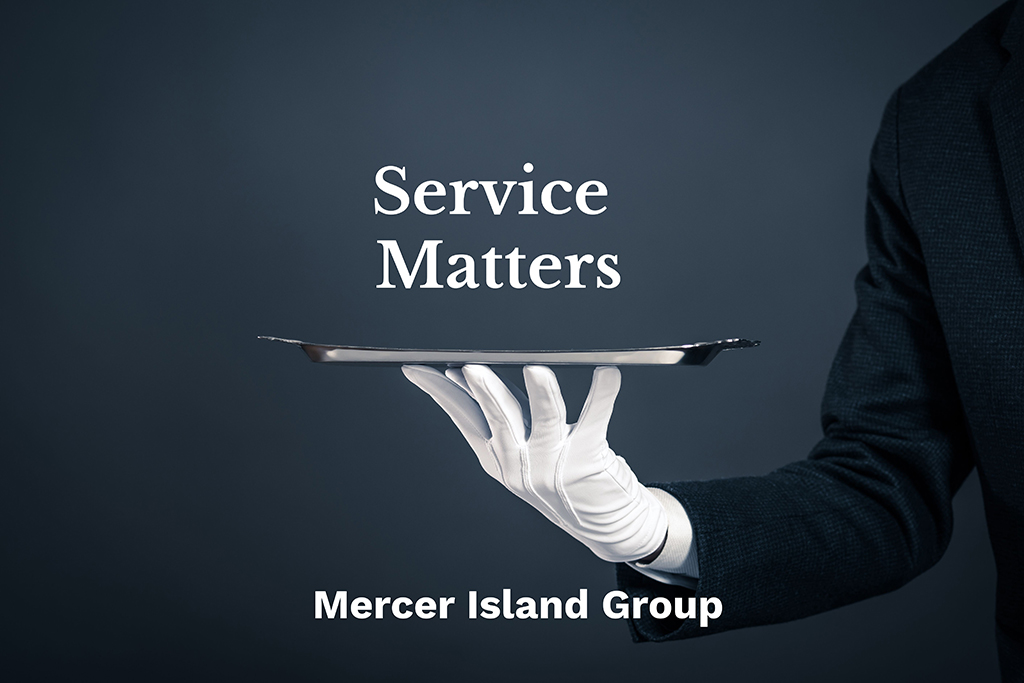I’m on a long flight today and the experience has been a good reminder that a big part of an agency’s product is the service they deliver. And clients play a significant role in that service.
Back to my travel story! We had left the airline lounge and the hot coffee and treats to find that the inbound flight from Phoenix to a Seatac N gate was late, and a gate change was needed. There was no warning when we left the lounge. The gate change announcement sent us to the C gates. If you’re familiar with Seatac, you likely remember that the change to a C gate meant a train ride. Upon arriving at the C gates, we found another change. This time we were sent from the C gates to the D gates. Back on the train!
Arriving at the D gate, we waited a bit to then be sent to a different D gate. There were also new boarding and departure times, so we headed back to the airline lounge. When it was time to board (according to the flight status screen) we returned to the gate to find… the incoming airline still had not arrived. We had left the lounge twice, had a couple train rides and still had no airplane or even a new boarding time.
What does this have to do with clients and agencies?
Everything.
In our experience managing hundreds of 360 client-agency reviews, we have learned a fundamental truth: regardless of what led to the marriage, the agency’s service is the main issue that results in an agency losing the client. And clients themselves can play a very significant role in the level of service that they receive from their agencies.
Service can mean a lot of things in the agency business. Some areas we often hear about include:
- Proactivity
- Responsiveness
- Timeliness
- Thoroughness
- Attention to detail
Of course, in addition to service the agency’s “product” must continue to be strong. Strategy work must be compelling. The creative or media or media relations or whatever the delivery is must meet the client’s needs.
Clients also play an important role in the service levels they receive. Bad clients pay higher rates, sometimes get less talented agency staff and sometimes receive poor work. It’s simple human nature.
Failures in service delivery by either partner – whether it is timeliness, responsiveness, attentiveness or any other ‘ness – can make a world of (negative) difference.
Of course, it was much easier to write that sentence than for clients and agencies to deliver exceptional service in real life. Maintaining a highly effective, service focused marketing & agency relationship these days requires skills, expertise, and approaches that cover many areas. A way to simplify this long but important list of efforts is to think of it as the “3 P’s” of the marketing & agency relationship: people, processes and plans. You won’t consistently get to the 4th P – the fantastic product (the work!) – without attention to these 3 P’s.
Let’s talk about key aspects of each of these 3P’s that will help marketers and their agencies deliver service levels that set each other up for success.
The 3P’s to an Effective Client & Agency Relationship
Most key aspects of running an effective marketing and agency relationship can be summarized as part of the following 3P’s:
People: Even with the ever-growing amount of data, marketing technology and AI, the agency business is a people business. The people need to be committed to the relationship and trained in all the skills needed to deliver great work that builds the business. And they need to be treated well (by their management and their client) if they are to deliver ideal service levels.
Processes: Effective marketing and agency work needs effective processes to provide ideal service levels, efficiently succeed and to avoid reinventing things continuously.
Plans: Proper planning is needed for proper service levels. This planning helps ensure alignment on what needs to be done: how, when, and why.
Our message to clients and agency execs is simple: service matters. Deliver great service and your teams and partners will thrive.
Steve Boehler, founder, and partner at Mercer Island Group has led consulting teams on behalf of clients as diverse as Ulta Beauty, Microsoft, UScellular, Nintendo, Kaiser Permanente, Holland America Line, Stop & Shop, Qualcomm, Brooks Running, and numerous others. He founded MIG after serving as a division president in a Fortune 100 when he was only 32. Earlier in his career, Steve Boehler cut his teeth with a decade in Brand Management at Procter & Gamble, leading brands like Tide, Pringles, and Jif.
